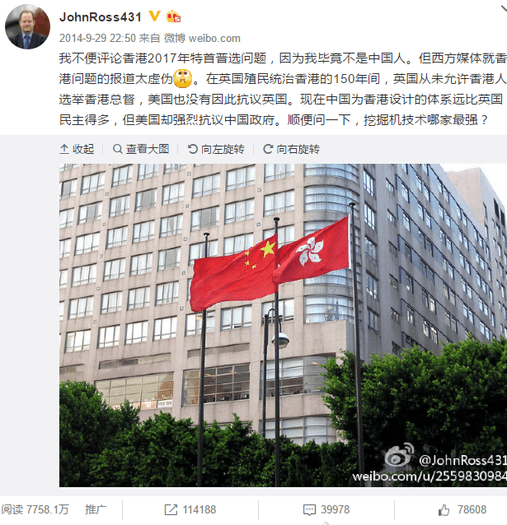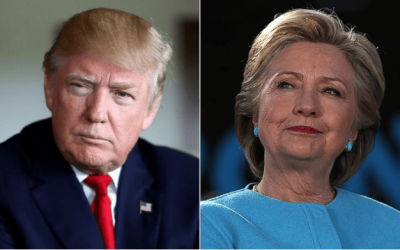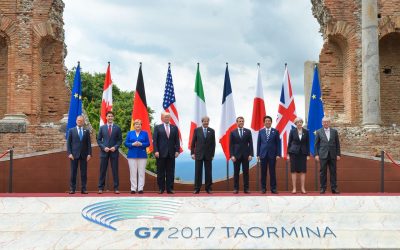China’s President Xi Jinping has strongly stressed that reunification with Hong Kong was a great victory achieved by China on the path of full national unity and that this victory was even greater because it was achieved by peaceful means. To understand what that means, let’s make a comparison everyone in the West can understand. When Lincoln, generally regarded as one of the very greatest of US Presidents, was faced with secession by the South, he waged the bloodiest war in US history to prevent it and to maintain the unity of the United States. The Northern generals Grant and Sherman fought that war with savage ruthlessness – Sherman openly declared ‘I would make this war as severe as possible, and show no symptoms of tiring till the South begs for mercy’ and his actions matched his words by inventing ‘total war.’ But China secured its territorial integrity, reunification with Hong Kong, by peaceful means.
Because this was a victory for the Chinese people, all other people’s rights to celebrate are minor in comparison. But nevertheless, it is worth pointing out why the reunification of Hong Kong with China was also a victory for Britain. This means examining the real role of Britain colonial policy in Hong Kong and the problems it created – many of them deliberately. It also shows the hypocrisy of Britain’s role in Hong Kong – unfortunately continuing to this day. This article by examining Britain’s occupation of Hong Kong therefore understands the real dynamics between Hong Kong and China and how problems will be overcome. This article combines two articles published in Chinese in Guancha.cn and Global Times.
Britain’s damage to China
Britain’s occupation of Hong Kong began with hypocrisy, continued with hypocrisy, and some of Britain’s statements to this day continue to reek of the same hypocrisy. Britain’s actions did great damage not only to Mainland China but to the people of Hong Kong and to Britain itself. The most important people to celebrate national reunification on 1 July are therefore the Chinese people in both the Mainland and Hong Kong. But the British people also have their own smaller reason to participate in this celebrate.
The damage to China of Britain’s colonial actions on Hong Kong are well known internationally – if frequently carefully glossed over in Britain itself. The seizure of Hong Kong in the First Opium War of 1839-1842 opened up over a century of foreign aggression against China. That war itself was waged by Britain to allow it to export opium to China – thereby directly condemning to misery and death millions of people. This began a century of foreign invasions or and interventions in China, the direct and indirect consequences of which, in social upheaval and civil war, resulted in the deaths of perhaps one hundred million Chinese peopled. Millions of other Chinese or sacrificed their lives as martyrs in the struggle against that foreign invasion and intervention before the Communist Party of China led by Mao Zedong finally freed China from this foreign intervention.
Someone who is Chinese can explain infinitely more adequately than any foreigner the national pain and sacrifice of that struggle so I will not try. All I can say is that strangely it was a supporter of the Kuomingtang who movingly summarised it on British radio on the anniversary of the creation of the PRC in a way non-Chinese could clearly understand: ‘Mao Zedong and Zhou Enlai drove the foreign occupiers out of China and no one can take this glory away from them.’
Because someone who is Chinese can deal with the effects on China far more adequately than I can, here I will deal with the effects of Hong Kong on two other groups of people – on Britain and on Hong Kong. On the latter, I have perhaps one advantage that, because I am not Chinese, some people in Hong Kong speak to me more openly than they would someone from Mainland China. I hope making this analysis may make it easier to understand the origins of some issues with Hong Kong and how they will be historically overcome as the legacy of British colonialism fades.
Britain and ‘Western values’ in Hong Kong
Starting with Britain, how did it gain Hong Kong? It waged a war to force China to import opium – that is Britain condemned millions to misery and death by drug addiction so Britain could make a profit. This was hypocrisy of ‘Western civilization’.
Britain then continued to rule Hong Kong for over 150 years, for most of that time with a racist system of a British elite and few hand-picked rich Chinese, without allowing the election of the governor of Hong Kong – only to suddenly discover when Hong Kong was to be returned to China it was a ‘fundamental principle’ Hong Kong must elect its governor by a specific system. Strange this ‘fundamental principle’ was never carried out by Britain. The consequences for Hong Kong of Britain’s deliberate attempt to create a Hong Kong ‘comprador elite’ cut off from and actively hostile to China are analysed below.
When Margaret Thatcher said Britain should continue to play some role in the running of Hong Kong after its return to China she received a blunt ‘no’ from, Deng Xiaoping – so shocking the so called ‘iron lady’ that she famously fell over on the visit at the shock of meeting a real great historical figure and his response for his country.
Now that Hong Kong has been returned to a China from which it was stolen by force and drugs, and incidentally now does chose its chief executive by a more democratic system than Britain ever allowed, people who carried out this undemocratic system, such the last governor Chris Patten, continue to write hypocritical articles which never explain the real history of Britain in Hong Kong.
There is a lesson in all this for Britain itself. Marx famously wrote ‘A nation that enslaves another forges its own chains’. He said it about Britain’s relation to Ireland but it equally applies to Hong Kong. Among the chains that a country forges for itself by enslaving another are mental ones. Britain cannot see its own reality until it sees honestly the hypocrisy and crimes its colonialism inflicted on other countries. Discovering the truth about Britain’s past, including centrally on Hong Kong, is therefore part of the road to Britain’s own real liberation.
In Britain’s foreign relations there is a simple test to find out what Britain should be proud of and what it should be ashamed of and Hong Kong forms a central part of that. Numerous things from Britain are avidly voluntarily welcomed by other countries – from Shakespeare, Newton, and Darwin to Harry Potter! These are things every person in Britain can and should be proud of. Those things which Britain enforced on other peoples and countries by force – the Atlantic Slave trade, the occupation of Ireland, the occupation of India, and centrally the occupation of Hong Kong – are things to be ashamed of in Britain’s history.
So on 1 July people in Britain should join China’s great party and have a glass of champagne or baijiu (Chinese rice wine0 to celebrate the anniversary of the righting of a great wrong – the seizure of Hong Kong. And by sweeping away the cobwebs of Britain’s hypocrisy on Hong Kong this will not only, most importantly, celebrate China righting a great wrong but help to create the mental conditions for really liberating Britain itself from the same hypocrisy and chains.
Britain’s effect on Hong Kong
Turning to Hong Kong, the way I am viewed by people in Hong Kong who do not know me is inevitably different to someone from Mainland China – because I am not Chinese and because my country Britain was the former colonial power. Therefore, initially, some people speak to me more ‘openly’ than they would to someone from Mainland China. As I therefore have experiences not directly available to people from Mainland China it may be useful to give some of these. I apologise in advance some of this information may appear and is ‘offensive’ but it is only useful in such an important matter to present the real situation. They may help explain some problems in Hong Kong which flow from the legacy of British rule.
Britain ruled the largest Empire in the history. Its own forces were tiny compared to the territories it ruled. Therefore, it could not only rely on armed force to rule. It had to find a way to divide the populations it ruled and create layers who betrayed their own country and supported Britain. Britain had two standard techniques for this. First, to create a ‘comprador elite’ – that is a small privileged group of the country it ruled who were allowed to become rich under British rule and were given some access, even if second class, to high British society. Second to create a ‘slave mentality’, that is worship of the British rule, among some somewhat wider layers, often by getting such layers to look down on and despise others in the population. Both techniques were used in Hong Kong.
To make a comparison, if in India maharajas were allowed to allowed to keep local powers, parade with elephants in front of Queen Victoria or her emissaries, and join British cricket clubs, then in Hon
g Kong the local and appointed British rulers, who were few in number, allowed some Hong Kong Chinese to become rich – and also join exclusive British clubs.
To take another comparison, in Ireland Protestants were given privileges and encouraged to look down on the majority Catholic population: in Hong Kong some local social layers were encouraged to see themselves as superior to the Mainland Chinese. In Hong Kong Britain carried out a strategy similar to the South of the United States after slavery’s abolition. In the US Southern states the ‘poor whites’ were exploited by their local rulers but were encouraged not to challenge this by ‘looking down’ on the black population. In Hong Kong, the British encouraged parts of the local population to ignore the fact they were excluded from all real power in Hong Kong by the British occupation by considering themselves superior to Mainland China. There were, of course, always strong Chinese patriots in Hong Kong but Britain did everything it could to ‘divide and rule’. This explains some of the key problems faced during and after Hong Kong’s reunification with the Motherland.
Objectively Hong Kong’s economy thrived fundamentally because of its link to China. Indeed, there is an obvious ‘win-win’ for both Mainland China and Hong Kong. As long as China does not have a fully liberalised capital account, which cannot be done too quickly, it needs an offshore base to carry out RMB and other financial operations. Hong Kong is ideal for this. As China develops even more internationally, with initiatives such as One Belt One Road and the AIIB, Hong Kong can play a key role in this international expansion. But parts of the Hong Kong business elite for many years were integrated into the structure of their British rulers and are encouraged by the West not to orient to China’s economic needs. China’s economic success will overcome these problems but they create some temporary frictions.
This economic reality interacts with politics. Britain never allowed election of the governor in any form in the more than 150 years it ruled Hong Kong. But some in Britain suddenly announced direct election of the chief of the Hong Kong executive was a ‘fundamental principle’ after Britain had left Hong Kong. One aim in this was to encourage separatism – groups in Hong Kong were transparently financed and aided from abroad and acting in an organised way with Taiwan separatists who were similarly aided and financed from abroad.
This interacted with some parts of the Hong Kong population who were encouraged by the British to have a ‘poor white’ attitude to Mainland China. Here I apologise for telling true stories which are deeply offensive but they show the depth of the problem created by British rule.
At its most extreme one Hong Kong person I had to work with insisted on cleaning the plates when they went to a Mainland restaurant because they didn’t believe people from the Mainland could wash them properly – naturally when I found this out I ended relations with them. I know from writing about it on weibo [Chinese equivalent of Twitter] that Mainland Chinese working in Hong Kong found they were discriminated against by some Hong Kong colleagues – because their Hong Kong colleagues had been educated by the British to consider themselves superior to Mainland Chinese.
But the same people in Hong Kong who considered themselves superior to their countrymen and women from the Mainland were servile to those from the West.
Such attitudes by some Hong Kong people created by British rule, as is well known, even damaged Hong Kong’s economy by harming tourism from the Mainland.
A weibo I wrote on Hong Kong and British hypocrisy in it became the number 1 ranked weibo in China, and was even written about in US foreign policy magazines, so I know my analyses on this do not represent a fringe opinion.
I have no doubt from my experience that these problems will be overcome. There are real Chinese patriots from Hong Kong who I also met. China’s economic success is so great it provides the real centre of gravity for Hong Kong’s economy. I know Hong Kong people were repelled by the damage to its economy done by the Occupy movement. And China’s government has taken the right choices on all major issues regarding Hong Kong.
Chinese national identity is finally strong enough to overcome any of these problems I mentioned in Hong Kong. But the legacies of British colonial rule and intervention in China which started with the seizure of Hong Kong did enormous damage not only to China but to Hong Kong and to Britain – as this article has analysed.
I hope therefore people will understand why I wrote a weibo about it in Chinese: ‘On 1 July I will join China to celebrate Hong Kong’s return to China. Why? ‘A nation that enslaves another forges its own chains’ (Marx). Britain’s crime in seizing Hong Kong helped create a slaveholder mentality in the UK. The most important is China’s victory in national reunification, but as a smaller matter it is also a victory for my country.’







